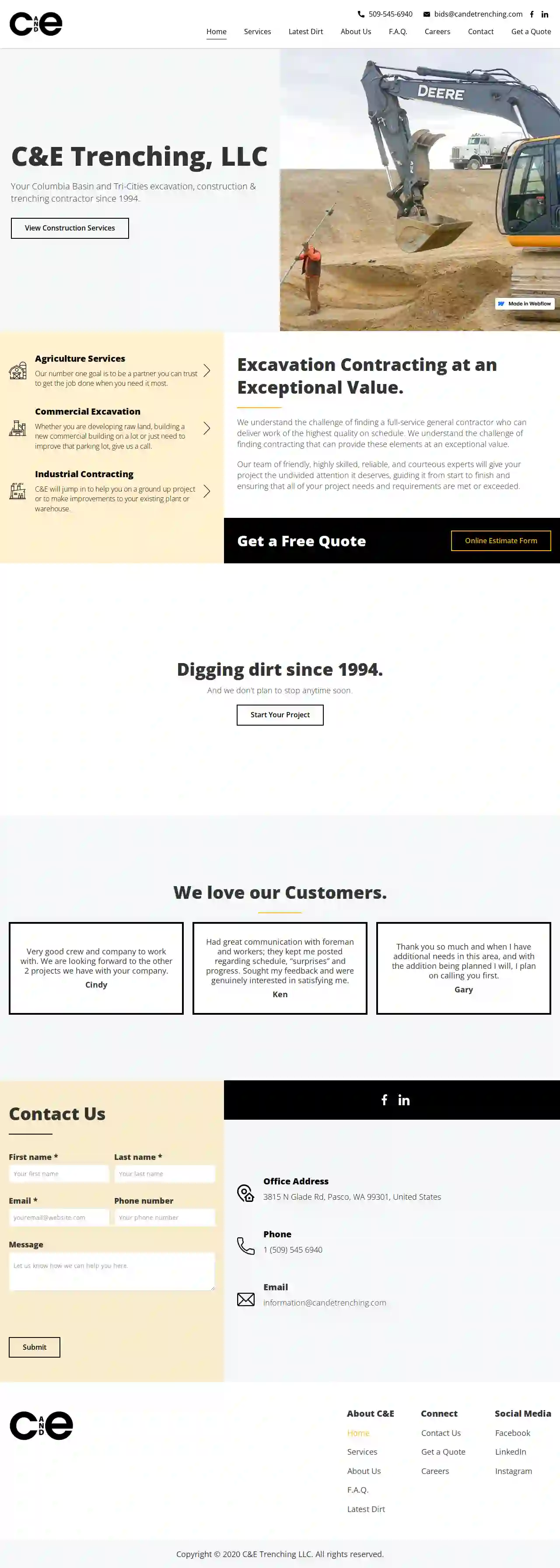Excavation Contractors Columbia
Find Trenching Services in Columbia
Get up to 3 Excavation Contractors Near Me quotes for your project today! Compare profiles, reviews, accreditations, portfolio, etc... and choose the best service.
- El
Elite Excavation and Concrete Services
1Columbia, US- Services
- Why Us?
Get Quote 
Legacy Lawn and Landscape LLC
4.36 reviews4315 Messara Lane, Pasco, WA 99301, 99301, USAbout Legacy Lawn & Landscape Legacy Lawn & Landscape was founded in 1999 by Nathan Pratt. Since then, we've achieved many milestones, gaining the knowledge and experience that has earned us a reputation as a top-quality landscaping firm. Our commitment is to build lasting relationships with our customers by exceeding their expectations and gaining their trust through exceptional performance in everything we do. We've proudly served the Tri-Cities area, including Richland, Pasco, and Kennewick. We now also offer landscaping and fencing services to Walla Walla, Yakima, and Spokane. Visit our Services page to discover how Legacy Lawn and Landscape can enhance your property!
- Services
- Why Us?
- Testimonials
- Gallery
Get Quote
C & E Trenching
4.714 reviews3813 N Glade Rd, Pasco, 99301, USC&E Trenching, LLC Your Columbia Basin and Tri-Cities excavation, construction & trenching contractor since 1994. We understand the challenge of finding a full-service general contractor who can deliver work of the highest quality on schedule. We understand the challenge of finding contracting that can provide these elements at an exceptional value. Our team of friendly, highly skilled, reliable, and courteous experts will give your project the undivided attention it deserves, guiding it from start to finish and ensuring that all of your project needs and requirements are met or exceeded. Digging dirt since 1994. And we don't plan to stop anytime soon.
- Services
- Why Us?
- Testimonials
- Gallery
Get Quote- De
Desmarais Service & Supply
1Columbia, US- Services
- Why Us?
Get Quote 
Ferraro Excavation
1Columbia, USFerraro Excavation Offering Excavator Operator Services in Walla Walla, College Place, and Surrounding areas. Specializing in trenching for water, sewer, septic systems. Rock walls, and land clearing. We can handle your, demolition, grading, and Trucking needs Too!. Put Us to Work on your project and let’s get it done!
- Services
- Why Us?
- Our Team
- Testimonials
- Gallery
Get Quote
Sewer Pros
59 reviewsColumbia, US- Services
- Why Us?
Get Quote- Ru
Russell Rockeries
53 reviewsColumbia, US- Services
- Why Us?
Get Quote 
Alameer Landscaping & Irrigation LLC
543 reviewsColumbia, USAlameer Landscaping LLC Alameer Landscaping LLC is a locally owned and operated landscaping company serving the Tri Cities, Benton City and Burbank area. We are dedicated to providing our clients with high-quality landscaping services at competitive prices. We are committed to customer satisfaction and strive to exceed your expectations on every project. We offer a wide range of services to meet your needs, including: Irrigation Maintenance Valve Replacement Sod Installation and Removal Land Clearing (Excavation) Junk Removal Our team of experienced professionals is committed to providing you with the best possible service. We use only the highest quality materials and equipment to ensure that your project is completed to the highest standards. We are also fully insured and bonded for your peace of mind. Contact us today for a free estimate!
- Services
- Why Us?
- Gallery
Get Quote- H2
H2 Excavating & Concrete
1Columbia, US- Services
- Why Us?
Get Quote - Jo
John Rada Excavating Inc
56 reviewsColumbia, US- Services
- Why Us?
Get Quote
Over 21,512+ Excavation Contractors on our directory
Our excavation contractors operate in Columbia and surroundings!
ExcavationHQ has curated and vetted the Best Excavation Pros in and around Columbia. Find a top & trustworthy pro today.
Frequently Asked Questions About Excavation Contractors
- Spring and Fall: Often considered favorable due to moderate temperatures and drier soil conditions.
- Summer: Can be suitable, but hot weather can make working conditions challenging and might require additional measures (shade, hydration) for workers.
- Winter: Excavation in winter can be more difficult due to frozen ground, snow, and potential delays caused by inclement weather. It might also require specialized equipment or techniques.
- Soil Type and Stability: Stable, cohesive soils allow for deeper excavations than loose or unstable soils.
- Groundwater Level: Excavations below the water table require dewatering techniques to manage water intrusion.
- Equipment and Resources: The size and capabilities of excavation equipment influence the achievable depth.
- Safety Regulations: OSHA and other safety regulations impose limitations on trench depths without proper shoring or sloping.
- Project Requirements: The purpose of the excavation (basement, pool, foundation) determines the necessary depth.
- Trench Collapses: Unstable trench walls can cave in, posing a severe risk to workers. Proper shoring and sloping are crucial safety measures.
- Utility Damage: Striking underground utilities (gas, water, electric) can cause leaks, explosions, or electrocution. Accurate utility locates and careful digging are essential.
- Falling Objects: Materials or equipment falling into excavations can injure workers. Securing work areas and using appropriate safety gear is vital.
- Equipment Accidents: Operating heavy machinery involves risks of rollovers, collisions, or mechanical failures. Trained operators and proper equipment maintenance are critical.
- Environmental Hazards: Excavated soil might contain hazardous materials (asbestos, lead). Proper testing and disposal procedures are necessary.
- Hauling to Designated Disposal Sites: Transporting excavated material to approved landfills or recycling centers.
- Recycling or Reuse: If suitable, some excavated soil might be recycled for other projects or reused on-site for landscaping or backfilling.
- Complying with Regulations: Adhering to local and environmental regulations for soil disposal to prevent contamination or illegal dumping.
What is the best time of year for excavation?
How deep can you excavate?
What are the risks associated with excavation?
How do you handle soil disposal after excavation?
What is the best time of year for excavation?
- Spring and Fall: Often considered favorable due to moderate temperatures and drier soil conditions.
- Summer: Can be suitable, but hot weather can make working conditions challenging and might require additional measures (shade, hydration) for workers.
- Winter: Excavation in winter can be more difficult due to frozen ground, snow, and potential delays caused by inclement weather. It might also require specialized equipment or techniques.
How deep can you excavate?
- Soil Type and Stability: Stable, cohesive soils allow for deeper excavations than loose or unstable soils.
- Groundwater Level: Excavations below the water table require dewatering techniques to manage water intrusion.
- Equipment and Resources: The size and capabilities of excavation equipment influence the achievable depth.
- Safety Regulations: OSHA and other safety regulations impose limitations on trench depths without proper shoring or sloping.
- Project Requirements: The purpose of the excavation (basement, pool, foundation) determines the necessary depth.
What are the risks associated with excavation?
- Trench Collapses: Unstable trench walls can cave in, posing a severe risk to workers. Proper shoring and sloping are crucial safety measures.
- Utility Damage: Striking underground utilities (gas, water, electric) can cause leaks, explosions, or electrocution. Accurate utility locates and careful digging are essential.
- Falling Objects: Materials or equipment falling into excavations can injure workers. Securing work areas and using appropriate safety gear is vital.
- Equipment Accidents: Operating heavy machinery involves risks of rollovers, collisions, or mechanical failures. Trained operators and proper equipment maintenance are critical.
- Environmental Hazards: Excavated soil might contain hazardous materials (asbestos, lead). Proper testing and disposal procedures are necessary.
How do you handle soil disposal after excavation?
- Hauling to Designated Disposal Sites: Transporting excavated material to approved landfills or recycling centers.
- Recycling or Reuse: If suitable, some excavated soil might be recycled for other projects or reused on-site for landscaping or backfilling.
- Complying with Regulations: Adhering to local and environmental regulations for soil disposal to prevent contamination or illegal dumping.